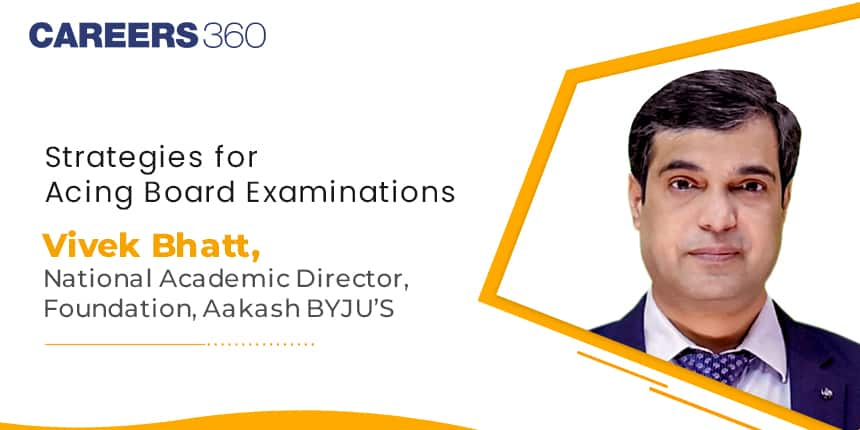7 Smart Strategies for Acing Board Examinations
Acing the board exams with flying colours is always the top priority for class 10th and 12th students. The board exam result is an indicator of a student’s aptitude and good performance in board exams sets his/her path towards academic excellence in the future. As announced by the CBSE board, the exams are going to commence from mid-February, and students are bound to find themselves overwhelmed with state board and NCERT textbooks, reference books, practice papers, mock tests, and a variety of study materials available. But, studying without a coherent strategy is not going to bear any fruit despite all the earnest labour.

Strategies for Acing Board Examinations
Here are some smart and time efficient strategies to help students ace board exams without taking on too much stress:
1. Follow a Meticulous Study Plan
Students should plan in advance how and what to study. An effective study plan will ensure targeted preparation and keep students motivated to achieve a good score in board exams. While making a study plan, students should keep in mind their most productive time. Since their brain is most active at that time, they should target completing the most difficult topics first as their retention will be better. Besides, it’s important that students set realistic and achievable goals. Avoid making monthly plans and stick to a daily & weekly achievable task list.
2. Prioritise High-weightage and Important Topics / Chapters
For board exam preparation, students should focus on revising high weightage and important topics / chapters first. Being thorough with these topics / chapters will help them to score more in boards. While preparing, they should categorise the chapters as difficult, moderate and easy so that they can allocate sufficient preparation time for each chapter. Give more time to chapters that are challenging, lengthy and require repeated revision and practice.
3. Read NCERT/State Board Textbooks In-depth Several Times
The syllabus of the Board Exams has been rationalised to some extent and as per the sample papers shared by the Board, the tests will be completely based on the rationalised syllabus from textbooks. Therefore, it’s essential that students study every line of the NCERT/State Board textbooks as questions can be asked from any section of the textbook. Pay special attention to in-text examples & exercise questions and solve questions of varying difficulty levels. Repeated practice of ‘assertion - reason’ and ‘case study based’ questions will help students assess their knowledge, identify their weak areas and work upon those before the main exam.
4. Increase Subjective Writing Practice to Improve Speed and Accuracy
What differentiates top scorers in Board exams from other students is their thorough understanding of the topics and the speed and accuracy with which they answer questions. To improve speed and accuracy, students should set a timer every time they practise a question or take a mock test. Solve as many CBSE sample papers as possible in a timed manner to improve writing speed and accuracy. Remember to write answers according to the marking scheme and word limit.
5. Build Exam Temperament and Learn Time Management
To achieve more in less time, learning time management skills is essential for students so that they do not compromise on their recreational activities. Develop exam temperament and learn time management skills by strictly following the study plan, achieving the set goals, and avoiding procrastination. Solve mock tests / practice papers within the stipulated time frame to understand how much time should be spent per section and per question, leaving sufficient room for revision.
6. Master Quick Revision of Chapters and Practice Papers
Focused and multiple revisions of the entire syllabus will ensure that students retain the applications of the concepts till the actual exam. Repeatedly practise questions of NCERT/State Board textbooks and NCERT Exemplar and read the study notes multiple times. Students should focus on revising already attempted practice papers and mock tests in order to analyse their mistakes, learn from them and improve upon their weak areas after discussion with teachers.
7. Get Accustomed to a Real Exam Scenario
To get rid of exam-related fears and anxieties, students should always replicate a real exam scenario. Find an isolated space with no distractions and mentally prepare to solve a mock test within the stipulated time. In order to adjust their biological clock as per exam timings, students should attempt the mock tests at the same time as that of the exam. This will help them get accustomed to the real exam scenario and overcome their exam anxiety.
Remember, the key to scoring well in board exams is to work with your strengths and manage time wisely. The above-mentioned smart and time-saving tips will hugely benefit students and achieve success in board exams.
Applications for Admissions are open.
As per latest syllabus. Physics formulas, equations, & laws of class 11 & 12th chapters
JEE Main Important Chemistry formulas
Get nowAs per latest syllabus. Chemistry formulas, equations, & laws of class 11 & 12th chapters
JEE Main high scoring chapters and topics
Get nowAs per latest 2024 syllabus. Study 40% syllabus and score upto 100% marks in JEE
JEE Main Important Mathematics Formulas
Get nowAs per latest syllabus. Maths formulas, equations, & theorems of class 11 & 12th chapters
